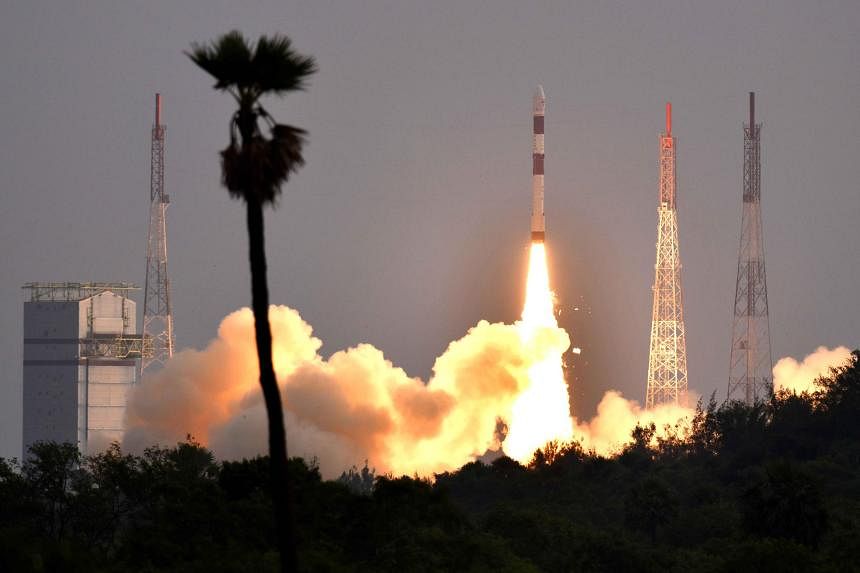NEW DELHI - Seven Singapore-made satellites were launched successfully by India into their intended orbits on Sunday, further deepening space collaboration between the two countries.
They took off at 6.31am local time on board a Polar Satellite Launch Vehicle (PSLV) of the Indian Space Research Organisation (Isro), from the Satish Dhawan Space Centre in Sriharikota, off the coast of Andhra Pradesh in South India.
The primary satellite on board this mission, which was dedicated entirely to Singapore, was DS-SAR, a 352kg radar imaging earth observation satellite developed through a partnership between Singapore’s Defence Science and Technology Agency and ST Engineering.
Once deployed and operational, it will support the satellite imagery requirements of various Singapore government agencies. The satellite, equipped with a radar payload developed by Israel Aerospace Industries, can provide all-weather, as well as day-and-night coverage, at a 1m resolution.
Another payload for the mission was the NuLIoN nanosatellite from NuSpace, a Singapore firm that provides Internet of Things connectivity across areas in the South-east Asia region with limited to non-existent communication infrastructure.
The rocket also carried the ORB-12 Strider satellite, developed under an international collaboration coordinated by Singapore-based space-tech company Aliena. It will demonstrate next-generation propulsion systems for small satellite constellations.
Other satellites on board this mission executed by NewSpace India Limited (NSIL), Isro’s commercial arm, included those from Nanyang Technological University and National University of Singapore (NUS).
According to an NUS statement, its Galassia-2 nanosatellite was built by students and will help with remote sensing for agriculture and environmental change using a multispectral camera on board.
All seven satellites were successfully injected into their orbits less than 24 minutes after the lift-off, which was accompanied by claps and whistles from the public viewing gallery on a cloudy monsoon morning.
The mission follows the PSLV-C55 one in April, which successfully launched two other Singapore-made satellites. As many as 20 Singapore-made satellites have so far been launched by India, including those on Sunday.
Thanking Isro for the “marvellous and precise mission”, Mr Radhakrishnan Durairaj, NSIL’s chairman and managing director, said he hoped Singapore would “continue to have trust in our services and the most reliable launcher – the PSLV”.
“I am sure they will offer many more opportunities for us to give them the best launch in the international community,” he added in an address soon after the launch.
Sunday’s mission was the 58th on the PSLV, which, since its development in 1993, has emerged as Isro’s reliable workhorse for satellite launches, with a success rate of more than 94 per cent.
India has launched over 425 satellites for 36 countries and has been making efforts in recent years to corner a greater share of the global launch market, estimated to be US$9.15 billion (S$12.2 billion).
While the momentum for launches has picked up following the pandemic, experts have noted that India’s space programme, including its ability to launch foreign satellites, continues to be held back by its inadequate infrastructure, including a limited number of launch pads.
“India’s requirements are today limited to not just civilian communications or earth observation, but also security and a whole range of other functions that have come about,” said Dr Rajeswari Pillai Rajagopalan, director of the Centre for Security, Strategy and Technology at the Observer Research Foundation in New Delhi.
“There is a growing demand, but supply has not kept up… Isro has a capacity deficit,” she told The Straits Times.
Expanding India’s ability to launch more satellites would require the government-run Isro to loosen its monopoly and allow the private sector to emerge as an independent and more active partner, Dr Rajagopalan added.
“There is clearly a recognition that Isro alone cannot deliver, and unless one brings in the private sector, you are going to lose out. This is something that has seeped into the Isro leadership as well.”
The government has made efforts to open up the space sector to private players in its bid to boost India’s share of the global space economy – valued at around US$460 billion – from just 2 per cent currently to 9 per cent in 2030.
In November 2022, Skyroot Aerospace, a Hyderabad-based start-up funded by Singapore’s sovereign wealth fund GIC, successfully launched India’s first privately built rocket.
Isro has also been working to privatise PSLV operations. At Sunday’s launch, Isro chairman S. Somanath said he expects “fully industry-owned PSLVs” being launched early 2024.
- Adenman
-

 1
1



Recommended Comments
There are no comments to display.
Join the conversation
You can post now and register later. If you have an account, sign in now to post with your account.
Note: Your post will require moderator approval before it will be visible.